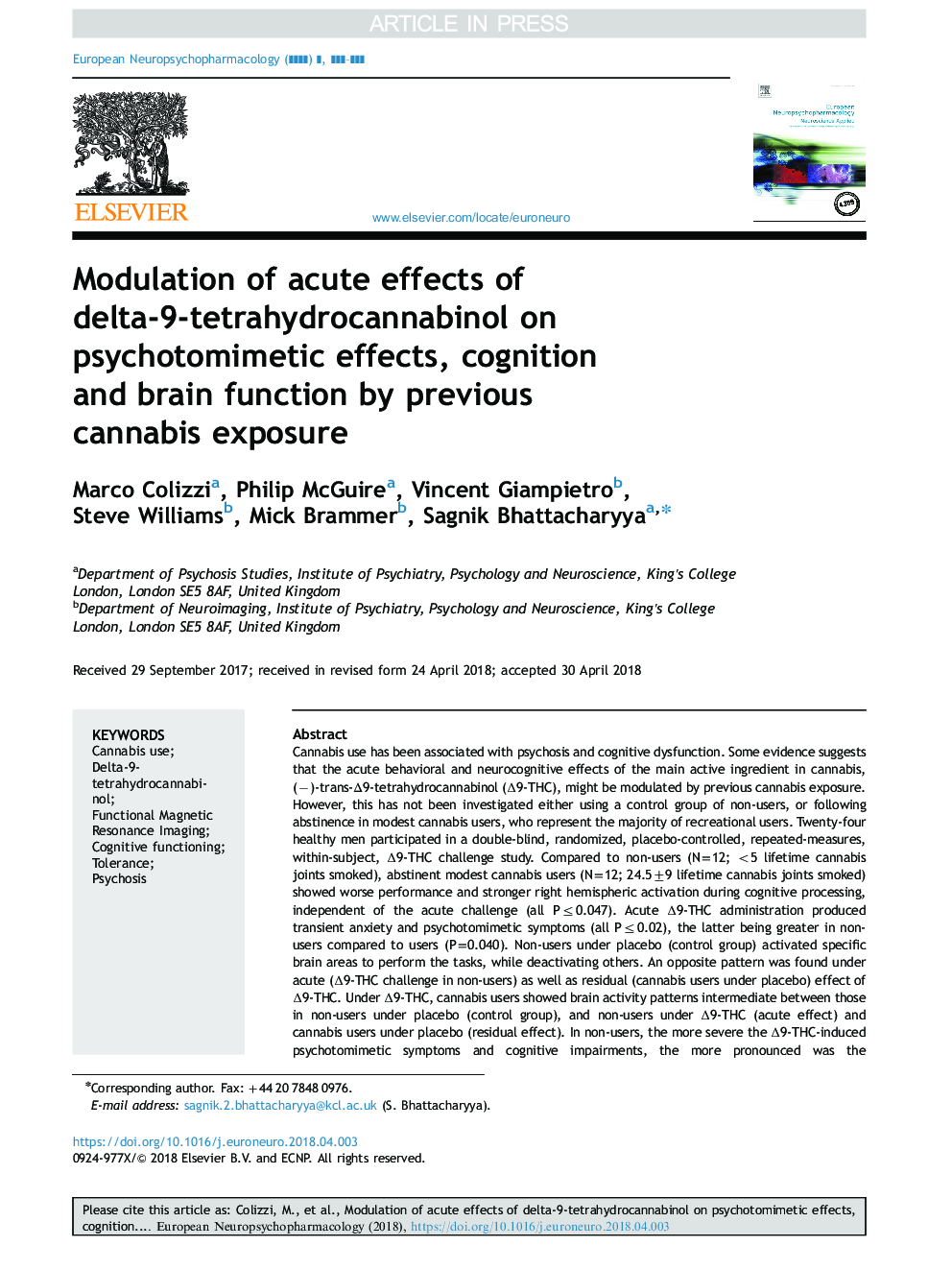| کد مقاله | کد نشریه | سال انتشار | مقاله انگلیسی | نسخه تمام متن |
|---|---|---|---|---|
| 6790383 | 1432677 | 2018 | 13 صفحه PDF | دانلود رایگان |
عنوان انگلیسی مقاله ISI
Modulation of acute effects of delta-9-tetrahydrocannabinol on psychotomimetic effects, cognition and brain function by previous cannabis exposure
ترجمه فارسی عنوان
مدولاسیون اثرات حاد دلتا-9-تتراهیدروکانانبینول بر اثرات روانگردانایی، شناختی و عملکرد مغز با قرار گرفتن در معرض کانابیس قبلی
دانلود مقاله + سفارش ترجمه
دانلود مقاله ISI انگلیسی
رایگان برای ایرانیان
کلمات کلیدی
مصرف کنسرو، دلتا-9-تتراهیدروکانیابینول، تصویربرداری رزونانس مغناطیسی کاربردی، عملکرد شناختی، تحمل، روانپریشی
موضوعات مرتبط
علوم زیستی و بیوفناوری
علم عصب شناسی
روانپزشکی بیولوژیکی
چکیده انگلیسی
Cannabis use has been associated with psychosis and cognitive dysfunction. Some evidence suggests that the acute behavioral and neurocognitive effects of the main active ingredient in cannabis, (â)-trans-Î9-tetrahydrocannabinol (â9-THC), might be modulated by previous cannabis exposure. However, this has not been investigated either using a control group of non-users, or following abstinence in modest cannabis users, who represent the majority of recreational users. Twenty-four healthy men participated in a double-blind, randomized, placebo-controlled, repeated-measures, within-subject, â9-THC challenge study. Compared to non-users (N=12; <5 lifetime cannabis joints smoked), abstinent modest cannabis users (N=12; 24.5±9 lifetime cannabis joints smoked) showed worse performance and stronger right hemispheric activation during cognitive processing, independent of the acute challenge (all Pâ¤0.047). Acute â9-THC administration produced transient anxiety and psychotomimetic symptoms (all Pâ¤0.02), the latter being greater in non-users compared to users (P=0.040). Non-users under placebo (control group) activated specific brain areas to perform the tasks, while deactivating others. An opposite pattern was found under acute (â9-THC challenge in non-users) as well as residual (cannabis users under placebo) effect of â9-THC. Under â9-THC, cannabis users showed brain activity patterns intermediate between those in non-users under placebo (control group), and non-users under â9-THC (acute effect) and cannabis users under placebo (residual effect). In non-users, the more severe the â9-THC-induced psychotomimetic symptoms and cognitive impairments, the more pronounced was the neurophysiological alteration (all Pâ¤0.036). Previous modest cannabis use blunts the acute behavioral and neurophysiological effects of â9-THC, which are more marked in people who have never used cannabis.
ناشر
Database: Elsevier - ScienceDirect (ساینس دایرکت)
Journal: European Neuropsychopharmacology - Volume 28, Issue 7, July 2018, Pages 850-862
Journal: European Neuropsychopharmacology - Volume 28, Issue 7, July 2018, Pages 850-862
نویسندگان
Marco Colizzi, Philip McGuire, Vincent Giampietro, Steve Williams, Mick Brammer, Sagnik Bhattacharyya,
